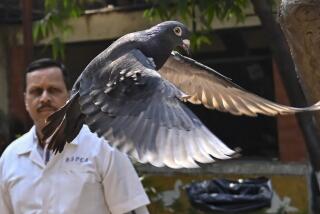Pigeon Theft a Low Blow to Lofty Sport
- Share via
RIEMST, Belgium — Pigeon breeder Laurent Rondags cradled the shattered bird shells in his hands and choked back tears. “Ten years of my life. And they didn’t even spare the eggs.”
In a nation smitten with pigeon racing, the theft of 36 of the finest doves from last year’s best performer--and the destruction of the next generation of potential champions--has touched a raw nerve.
For generations, pigeon watching has dominated the weekends of hundreds of thousands of Belgians, the world’s unrivaled pigeon breeders. But Monday’s theft illustrates how money has come to dominate a sport where prize birds now fetch more than $25,000.
The pigeons Rondags kept in a loft he built in his backyard were valued at more than $250,000--yet, like generations before him, he kept the key to his treasure on a ledge above the door.
Now, the 71-year-old Rondags is left with only his trophies--dozens of them filling his eastern Belgian home.
“This is what pigeon racing has turned into,” Rondags said bitterly.
“There is a streak of fanaticism among the big players, who even sell birds abroad,” said Belgian Pigeon Federation Chairman Marcel Van den Driessche.
In 1999, Rondags won nearly every regional pigeon-racing category, securing the coveted Golden Dove, the regional MVP title for pigeon fanciers.
Many believe that the prize birds might have been stolen for breeding--reaping the rewards of years of Rondags’ careful crossbreeding to create the best bloodline around.
The thieves took only the champions, leaving behind the young, and less valuable, birds.
“I’m left with some of the apples, but the apple tree has gone,” Rondags said.
Pigeon racing has declined in popularity in Belgium even as the values of champion birds have skyrocketed. Just after World War II, the pigeon federation had a quarter-million members in a nation of 10 million. Now it has about 60,000--most of them elderly.
“The old fanciers stop, and there is no one to take over,” Van den Driessche said.
Pigeon breeding has always been a full-time hobby, what with feeding, cleaning, releasing and fetching pigeons. “Now, youth has so many other temptations,” Van den Driessche said.
Champion breeder Jos Thone recalls how as a youngster he begged to clean the pigeon lofts of the top racers so he could learn every trick of the trade.
Four World Championship titles later, Thone is trying to reinvigorate the sport, building a $5-million World Pigeon Center that opens in the spring.
There, for $500 a year, pigeon lovers will be able to house their birds--and race them with the best in the business--without the daily headache of caring for them.
It’s not exactly the halcyon sight of men in tweeds carrying their pigeons in wicker baskets to a day at the races--but it’s the next best thing, Thone said.
“We lose people because there is no more time in the modern world,” Thone said. “This way we can bring them back.”
More to Read
Sign up for Essential California
The most important California stories and recommendations in your inbox every morning.
You may occasionally receive promotional content from the Los Angeles Times.













